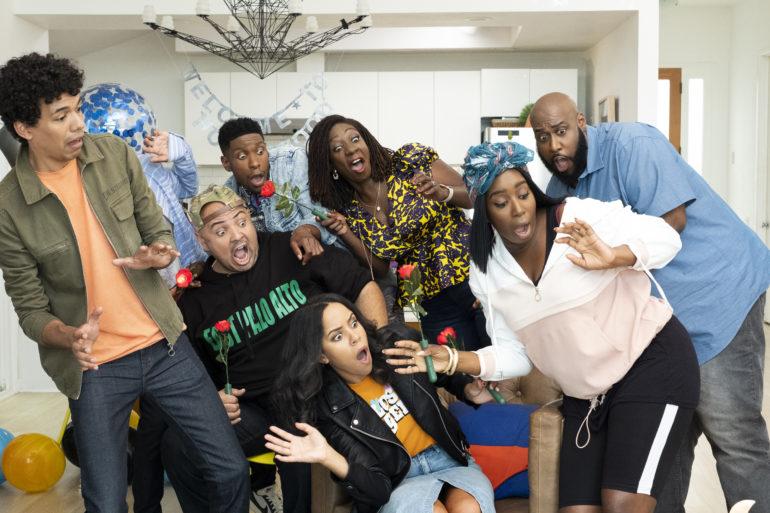Why ‘Astronomy Club,’ ‘Sherman’s Showcase’ Choose Cultural Comedy Over Politics
By Mekeisha Madden Toby
LOS ANGELES (Variety.com) – Let “Saturday Night Live” do all the President Trump sketches it wants. Over on HBO’s “A Black Lady Sketch Show,” there are skits that cleverly parody how slow soul food restaurants are and how it feels to be overlooked in society with a recurring bit called “Invisible Spy.” Meanwhile, “Sherman’s Showcase” on IFC pokes fun at music-driven biopics with “This Is How He Did It: The Montell Jordan Story” and gives a nod in every episode to an obscure 1970s Afro Sheen commercial featuring Frederick Douglass. And Comedy Central’s “Alternatino with Arturo Castro,” mocks everything from drunk wedding guests to popstar Pitbull and the inhumane treatment at ICE detention centers.
When the new series “Astronomy Club: The Sketch Show” premieres on Netflix Friday, comedy lovers can expect the same type of culturally relevant topics and humor. Executive produced by Kenya Barris (“Black-ish”), the series pushes past the current administration in the White House and instead allows the eight comedians who make up the eponymous New York based sketch team to poke fun at racism, sexism and even reality shows in very personalized and social media sharable ways.
“There is so much political comedy on television, what else is there to say?” asks Jerah Milligan, an Astronomy Club member and castmate. “We know the system is trash. We know there’s a deep racial tension in America. We, like everyone else, will continue to do our part in fighting to change what’s happening. But we need comedy that makes you laugh. We decided early on that if we didn’t have a fresh take or something new to say about politics, let someone else do it.”
Laughing matters on “Astronomy Club” run the gamut from a dating app mishap involving “resting creep face,” to a booty popping nod to “The Twilight Zone’s” classic “Nightmare at 20,000 Feet” episode and even a support group for “Magical Negroes.”
EGOT winner John Legend is one of the executive producers behind “Sherman’s Showcase.” He says the beauty of programs such as his, “” and “Astronomy Club” is that they further prove that black people aren’t a monolith. For instance, “Sherman’s Showcase” blends music and comedy a la “In Living Color,” while “A Black Lady Sketch Show,” which was created by comedian Robin Thede, boasts an all-black women writers room and an all-black female cast that portrays women and men.
“There’s so much range as far as what you’re seeing from black creators right now,” Legend says. “You’re seeing so many shades of who we are and so many sides of our reality and different people’s perspectives. I’m just so grateful that we’re able to produce in this era where there are so many different opportunities for great content from our people and from a diverse range of our people.”
The range of voices being brought in to work on such shows allows them to get specific with their stories and senses of humor. Political comedy often polarizes its audience, parodying a person or topic that many feel passionate about and therefore do not want to laugh at, but commenting on culture at large can attract equally wide audiences.
“With a pie chart, every non-white thing gets a slice. That’s the old way of looking at difference,” says Linda Ong, the chief cultural officer at Ryan Seacrest’s Civic Entertainment Group. “But the way that we talk about difference going forward, and it’s very youth oriented, is that everybody is different in the world, but what unites us is that we’re all human. We can all speak to these human truths but do them in a way — whether it’s black or gay or Asian or trans or whatever — that is relatable. All these differences that we’re now seeing is not about a segment watching a segment. It’s people watching a show trying to understand everybody who’s different across all these segments and investigating what it means to be human.”
It’s a humanity that comes from a very culturally specific and unapologetic place, a place where punchlines aren’t explained and viewers either get ingroup jokes or they don’t. Issa Rae, one of the executive producers on “A Black Lady Sketch Show” has famously said that she doesn’t write for men or white people but for herself and her friends. And “A Black Lady Sketch Show,” “Sherman’s Showcase,” “Alternatino” and “Astronomy Club” all seem to be operating in that same space of cultural defiance and coolness.
As far as precedence is concerned, Bashir Salahuddin and Diallo Riddle, the creators behind “Sherman’s Showcase,” and Milligan of “Astronomy Club” all point to “In Living Color” — which aired for five seasons on Fox until 1994 — and Robert Townsend’s “Partners in Crime” comedy specials on HBO from the early 1990s as the trailblazers that made their current shows possible. Milligan also notes “Chappelle’s Show” and “Key & Peele.”
Unfortunately, those shows and specials burned bright and eventually burned out or just went away as networks moved on to other trends and stars. Jonathan Braylock, an “Astronomy Club” player who also guested on “Alternatino,” says he hopes that his group’s show and the other sketch offerings with all black and brown casts last as long as “In Living Color” and “Key & Peele,” if not longer.
“My hope is that this isn’t just a fad and can simply be the norm,” Braylock says. “People of color have just as much of a right to the sketch space as the endless list of white-only sketch shows that came before us.”
“Astronomy Club” premieres Friday Dec. 6 on Netflix.

